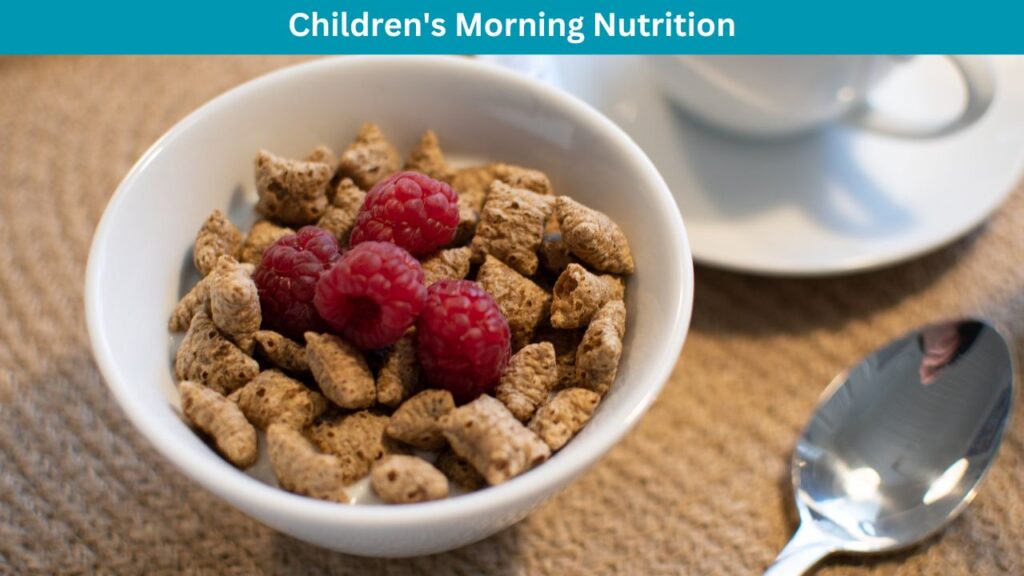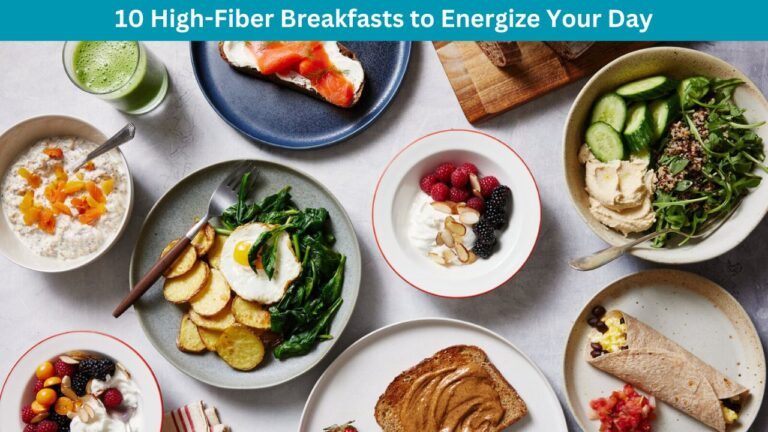Morning Nutrition Guide for Kids | Breakfast Boost
Morning Nutrition Guide for Kids – Every morning, parents face a familiar question: “Have you had breakfast?” Although this daily ritual may appear ordinary, but recent studies have uncovered the significant influence a nourishing morning meal can exert on the lives of children, surpassing mere physical nourishment.

Breakfast serves as a catalyst that sparks their cognitive abilities, emotional welfare, and interpersonal relationships, laying the groundwork for a prosperous and satisfying day.
Why Breakfast Matters:
Skipping breakfast depletes your child’s energy reserves, which directly impacts on:
- Energy levels: Kids may experience a lack of vitality, hindering their capacity to engage in activities, acquire knowledge, and maintain focus.
- Mood: The absence of food can lead to irritability and emotional outbursts, commonly known as being “hangry.”
- Focus: Without the necessary glucose boost, kids brains struggle to process information effectively and retain memories.
- Nutrition: Breakfast establishes the foundation for kids daily nutrient intake, ensuring they receive vital vitamins, minerals, and fiber throughout the day.
Building a Balanced Breakfast Plate:
Consider breakfast as a foundation for your child’s day. Aim for a balanced plate that includes following elements:
- Whole Grains: Select whole-wheat toast, oatmeal, whole-grain pancakes, or high-fiber cereal to supply sustained energy and support healthy digestion.
- Protein: Eggs, yogurt, nut butter, beans, or lean meats such as chicken sausage offer essential building blocks for growth and muscle development.
- Fruits and Vegetables: Incorporate vibrant colors to enhance vitamin and antioxidant intake. Opt for sliced berries, banana chunks, chopped spinach, or blend them into a smoothie.
- Healthy Fats: Avocados, nuts, and seeds provide a feeling of fullness and contribute to brain development. Strive for moderate portions and choose unsalted options.

Breakfast Magic: Fun & Delicious Ideas:
Turn breakfast into an adventure with engaging presentations and kid-friendly choices:
- Craft your own Smoothie Bar: Arrange a selection of yogurt, fruits, and vegetables alongside milk, nut butter, and other additional ingredients. Allow your child to embrace their inner “smoothie chef” and concoct their very own creation.
- Personalize your Oatmeal Station: Provide plain oatmeal with an array of toppings such as berries, nuts, seeds, dried fruit, and a drizzle of honey. They will relish the opportunity to add their own personal touch.
- Vibrant Rainbow Skewers: Skewer whole-wheat toast pieces, cheese cubes, fruit slices, and cherry tomatoes for a playful and colorful bite.
- Bite-sized Frittatas: Whisk eggs with diced vegetables and cheese, pour the mixture into muffin tins, and bake for a mini, protein-packed breakfast delight.
- Overnight Oats: Combine rolled oats, yogurt, milk, chia seeds, and their favorite fruits in a jar the night before. This grab-and-go breakfast is both nutritious and delectable.
Taming Picky Eaters:
- Get them involved: Allow your child to select age-appropriate ingredients for their breakfast. This sense of ownership will ignite their excitement and make them more willing to try new foods.
- Pay attention to presentation: Arrange the food in creative shapes or faces using cookie cutters or edible art techniques. Experiment with different colors and textures to spark their curiosity.
- Provide options: Offer two or three healthy choices within each food category (such as cereal, protein, and fruit) and let them choose their favorites.
- Start gradually: Avoid pressuring them to completely change their eating habits overnight. Instead, introduce new foods slowly alongside their familiar favorites, gradually building acceptance.
- Maintain patience and positivity: Encourage their exploration of new foods and celebrate their willingness to try, even if they don’t immediately love it.
Science Unveils the Breakfast Connection:
A comprehensive study published in Frontiers in Nutrition delved into the breakfast habits of Spanish adolescents, meticulously examining the link between their breakfast choices and psychosocial well-being.
This encompassed crucial factors like self-esteem, mood, and anxiety levels. The results were compelling: skipping breakfast or opting for convenient, sugary options significantly increased the likelihood of experiencing psychosocial issues.
Furthermore, the study highlighted the crucial role of breakfast composition. Those who embraced breakfasts rich in dairy products, whole grains, and fruits displayed a lower risk of psychosocial problems.
Conversely, sugary cereals and processed meats were associated with a higher risk. This underscores the importance of making nutrient-dense choices to optimize brain function and emotional well-being.
But the story doesn’t end there. The location of breakfast consumption also emerged as a crucial factor.
Having breakfast at home was found to have a protective effect. Shared meals foster family routines and strengthen emotional bonds, contributing significantly to positive mental well-being.

Unpacking the Science:
What makes a nutritious, home-cooked breakfast so impactful? Here are some key explanations:
- Cognitive Enhancement: A healthy breakfast replenishes the brain’s glycogen stores, its primary energy source. This translates to improved concentration, memory, and learning abilities. These cognitive benefits are vital for academic success and can also boost children’s confidence.
- Emotional Stability: Skipping breakfast can trigger stress hormones and blood sugar fluctuations, leading to mood swings and anxiety. On the other hand, a balanced breakfast helps regulate these chemicals, promoting emotional stability and resilience.
- Strengthening Family Bonds: Breakfasting together fosters a sense of connection, communication, and positive family dynamics. These nurturing relationships provide emotional support and a sense of belonging, crucial for developing healthy coping mechanisms and navigating social challenges.
Building Healthy Habits:
Developing healthy habits takes time and patience. Focus on making gradual changes, acknowledge and celebrate small achievements, and emphasize the positive impacts of nurturing young minds and bodies. Every nutritious bite paves the way for a brighter future.
You may also like : Mindful Eating for a Balanced and Harmonious Life
Transforming Breakfast into a Joyful Tradition:
Translating research findings into daily life requires practical steps. Here are some tips for parents:
- Stock Up on Nutritious Essentials: Keep your pantry well-stocked with whole grains (oatmeal, whole-wheat bread), fruits (fresh, frozen, dried), nuts and seeds, yogurt, and eggs to create quick and nutritious breakfasts.
- Get Creative with Delicious Options: Ditch the monotony! Introduce exciting options like colorful smoothie bowls, overnight oats with fun toppings, or whole-wheat waffles with fruit and nut butter. Make breakfast a delightful experience they look forward to.
- Make Breakfast a Family Tradition: Set aside time for leisurely, shared breakfasts. This is a golden opportunity for conversation, laughter, and creating positive memories that nourish both minds and spirits.
- Lead by Example: Prioritize breakfast yourself and demonstrate its importance. Enjoying breakfast together reinforces its value and allows you to reap the benefits as a family.
Beyond Breakfast:
Remember, breakfast is just one piece of the puzzle. A holistic approach to children’s well-being encompasses healthy lunches, dinners, snacks, adequate sleep, physical activity, and emotional support. By addressing these elements comprehensively, you can empower your children to thrive.
Together, let’s make every breakfast a delicious step towards a healthier, happier future for our children.
FAQs – Morning Nutrition Guide for Kids
Q1. What breakfast choices reduce psychosocial risks in children?
Studies suggest that a plate filled with dairy, cereals, and fruits is associated with lower odds of psychosocial issues. On the contrary, processed meats and sugary cereals are linked to a higher risk.
Q2. How does Home Breakfast affect emotional well-being?
Breakfast at home serves as a source of connection, communication, and positive family dynamics. The shared experience fosters emotional support and a sense of belonging, crucial for developing healthy coping mechanisms and navigating social challenges.
Q3. Does skipping breakfast impact academic success in youth?
Yes, skipping breakfast can impact academic success. A nutritious breakfast replenishes the brain’s energy source, leading to enhanced concentration, memory, and learning, which are pivotal for academic success and building confidence.
Q4. What are the main benefits of a healthy breakfast for children?
A nutritious breakfast can improve children’s energy levels, focus, mood, and overall well-being. It also contributes to better cognitive function, emotional stability, and strengthens family bonds through shared mealtimes.
Q5. How can I build a balanced breakfast plate for my child?
Focus on incorporating whole grains for sustained energy like oatmeal or whole-wheat toast. Include protein sources like eggs or yogurt for growth, and fruits and vegetables for vitamins and antioxidants. Don’t forget healthy fats like avocados or nuts for satiety and brain development.
Q6. What are some tips for dealing with picky eaters at breakfast time?
Get your child involved in choosing ingredients and preparing breakfast together. Make it fun and visually appealing with colorful presentations and playful options like rainbow skewers or smoothie bowls. Offer choices within each category and start small by gradually introducing new foods alongside familiar favorites. Be patient, positive, and encourage their willingness to try new things.





